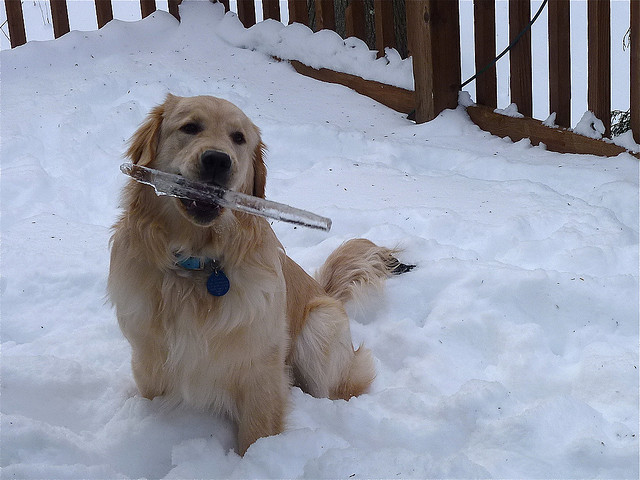Winter brings dangerous conditions for pets. A fur coat does not protect against hypothermia or the pain of arthritis. Here are a few other things you should know about winter pet care.
Guard Against Flaky Skin

Image via Flickr by normanack
Low humidity and cold wind makes human skin dry and flaky. Your pet is no different. While you can relieve the itch with lotion and creams, your pet will chew and scratch until his or her skin is raw. To protect your pet from this, limit bathing and shampooing during the colder months. These treatments tend to dry out the skin. Also, limit the pet’s exposure to de-ice treatments as they can cause skin irritation.
Brush your pet often to stimulate the hair follicles and the skin’s oil glands. Supplements containing omega-3 and omega-6 fatty acids improve the health of your pet’s skin. To find the right one for your pet based on breed and age, consult a vet on Kuddly.
Understand the Effects of Cold
Many of the same effects that bother us in cold, such as painful, stiff joints, also bother elderly pets. The larger they are, the more prone they are to conditions like arthritis. Not only does the cold make movement more difficult and painful, but icy conditions can make elderly pets afraid of walking. While it’s natural to want to restrict walks during cold times, regular exercise helps ease the pain of arthritis. Don’t give up your walks entirely. Take shorter, more frequent walks, or encourage frequent exercise.
Outdoor animals get cold too. Horses, and other animals, require special care in the winter even though they’ve never been inside.
Know Who’s at Risk
Some pets are more sensitive to cold than others. Pets with shorter hair feel cold more quickly, as do young or old pets. Pets with shorter legs (because their bellies are nearer to the ground and thus snow) will get colder quicker, as will pets with certain diseases such as diabetes, kidney ailments, and hormonal imbalances may have problems regulating their body temperatures and thus get colder faster. Be aware of the potential discomfort by monitoring their temperature. A veterinarian can help you understand the best way to do this.
Provide Options
Ever watch a dog circle around before finding the perfect spot, or a cat kneading at the pillow before settling down? Pets like to be comfortable too. In wintertime some spots are warm and some spots get too hot. Offering your fur baby a variety of safe places to sleep will make him or her more comfortable and allow the pet to regulate the temperature.
Honk to Avoid an Accident
Animals in the outdoors will find unusual places to enjoy the heat. A car engine is one of those places. Cats adore sleeping there. Before you start the engine, make some noise or honk your horn. The blurry shadow you see running from your car wouldn’t have fared well if you started that motor without the animal’s knowledge.
While winter is beautiful, it can be a time of distress to pets. Ensure their comfort with these tips.


Speak Your Mind